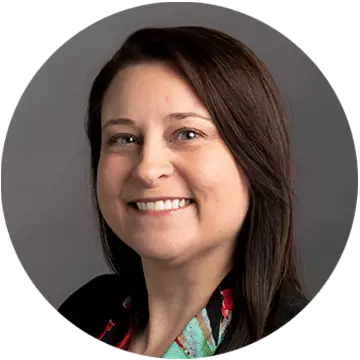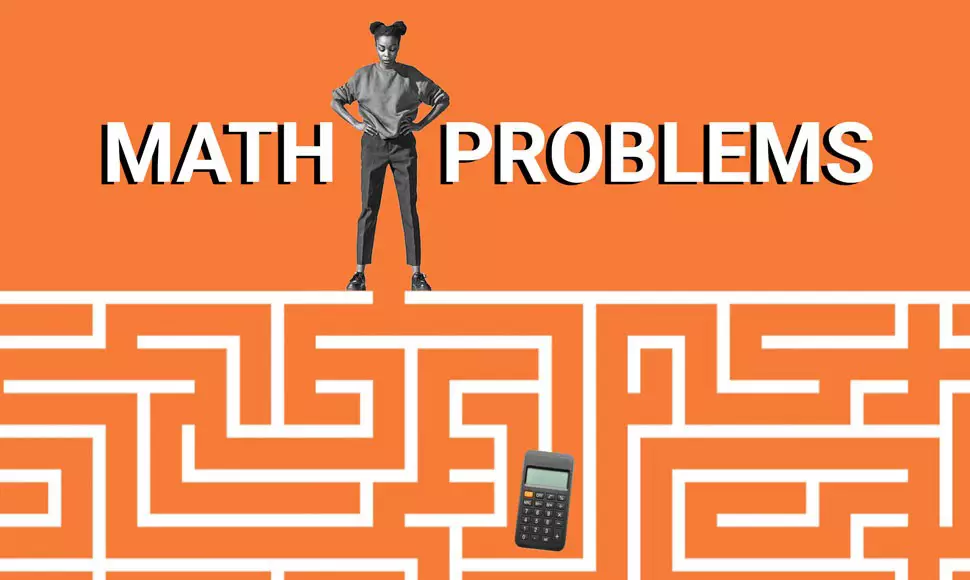What's math got to do with it?

Written by Michael Feder

Reviewed by Briana Houlihan, MBA, G-PM, Dean, College of General Studies

If you’ve ever taken a math course, chances are you’ve had that thought. Another popular one? It’s not like I’ll need this in real life.
Of course, that’s not true. As any adult knows, math is everywhere in the real world, from calculating how much you’ll spend at the grocery store, to doubling a recipe, to refinancing your mortgage. Yet, for all its ubiquity, math remains intimidating.
Why is math so hard?
“When any student comes to a math or science experience, they are bringing with them all of their prior experiences,” explains Jacquelyn Kelly, PhD, associate dean of the College of General Studies at University of Phoenix (UOPX). “Unfortunately, we have in the educational space as a whole created many opportunities for students to not feel great about their math and science abilities in the past. So, when they come to us, they’re essentially coming with some trauma associated with prior math and science experiences.”
That means if you’ve ever declared a math class was traumatic (and really, who hasn’t?), you weren’t just being dramatic. The good news? Kelly and others are on a quest to change college math so that your complicated past doesn’t dictate your future.
How did we get here?
It’s one thing to know that math intimidates a lot of people. It’s another to chart a course toward remediating that problem. To do so, you have to look at education throughout the 20th century. Somewhere along a road that has been punctuated by both legislation and educational theories, learning has gone from answering a human need for knowledge to getting good marks on tests.
“We’ve gotten to a place where education [means] selecting the right answer,” Kelly elaborates. “But if it’s all about picking the right answer, think about how much cognitive rigor we’ve just lost. We’ve lost the ability to actually stop and think, ‘What if? What does that mean?’”
Forfeiting curiosity and the mental stamina necessary to answer bigger questions is its own loss. But that loss carries with it additional repercussions.
“By the time they are 12 to 13, [students] make the decision whether they are going to be good at math and science or not,” Kelly explains.
She uses academic terms like “academic self-concept” and “negative confidence” to describe what are essentially feelings of inadequacy, shame and even fear many adults carry with them about math and their aptitude for it.
Interestingly, Kelly herself can relate to some extent. She came of age when it was “really not cool for girls and women to be good at math,” she says. Kelly pursued it anyway, but spent much of her young adulthood feeling like an impostor even as she earned her master’s in materials engineering and then her PhD in science, education and curriculum instruction.
Self-doubt, it seems, knows no boundaries.
The math therapists
Although Kelly has taught high school and college students, she currently focuses her energy and attention on “establishing a culture to keep math and science safe for [UOPX] students.”
Admittedly, language like that can feel opaque. Kelly acknowledges that the process of putting theory into practice is messy. But there are tangible ways to create an ideal. How, you ask? Consider the following:
A sense of belonging
Research indicates students need to feel like they belong in a class if they are to succeed, Kelly says. (This has to do with that principle noted earlier called academic self-concept.)
One way to put everyone at ease is to use familiar language. By eschewing highly technical, academic language in favor of relaxed, social language, instructors can tacitly confirm that each student is right where he or she is supposed to be.
For example, saying, “Read the text,” may be understandable, but it’s also cold and formal. Kelly suggests a better solution might be: “We’re going to learn about this idea.”
Taking this approach creates what Kelly calls a linguistic framework that empowers students not only to learn the material but also, eventually, to master the technical, formal language of mathematics. “That’s not dumbing it down,” Kelly says. “That’s increasing a level of cognitive rigor.”
College math, redefined
At UOPX, there are 150 undergraduate general education courses, but just 20 to 25 of them see 80% of the students, Kelly says. One of the most popular of these is undoubtedly Quantitative Reasoning. The course addresses quantitative literacy, which is a fancy way of saying, “What math do you need to adult?”
Kelly literally describes the course as fun because it puts math in various real-life contexts. Instead of determining when two cars on different trajectories will collide, for example, math becomes a vehicle for understanding which investment will yield the greatest return. Or, in Kelly’s case, when her in-laws should most advantageously withdraw Social Security.
“That’s all just simple algebra,” Kelly notes, “but those contexts are so much more meaningful.”
Kelly points out that at UOPX, where most students are adults and have been living with potentially negative math associations for upward of 15 years, one class won’t undo every misconception or negative feeling.
But it’s a start.
“This journey, especially in the introductory math, is so psychological,” Kelly explains. “The students have the capacity to complete these things. … It’s just overcoming the thoughts and perceptions we’ve created about ourselves to be able to do it and get out of our own way.”
Math for the future
The importance of “getting out of your own way” is profound. Anxiety and stress inhibit the “elevated cognitive states,” Kelly says, that are required for critical thinking, problem-solving and exploring new perspectives.
For Kelly and her colleagues, one way to encourage this process is to develop curriculum that begins at the very beginning.
She explains: “I think a lot of times there’s an incorrect assumption that all the simple math we need to know we’ve picked up in grade school and high school.
“So, the treatment of that math for adults is always labeled as remedial. And I’m really uncomfortable with that because the level of rigor of some of the content that we’re learning isn’t necessarily dependent on where it is in the progression of the concepts. It’s how deeply are you thinking about that content? How are you conceptually thinking about that content?”
Each course is intentionally scaffolded to introduce concepts that complement and build on one another, regardless of how much math students already know. In reconceptualizing the ways even basic math is understood, math classes in college (at least at UOPX) can promote a more thorough understanding of concepts. And that may just be the antidote to our current culture of “picking the right answer.”
Another advantage of relearning math (and learning it better) is the way it can impact future generations.
“We have a lot of parents who are just feeling so defeated because they can’t help their kids with Common Core, and Common Core is really great conceptually,” Kelly says. “It teaches students to do the things that we failed to do ourselves. But the problem is that we didn’t go back to triage ourselves. … So, we have a generation of traumatized people with respect to math and science. We have to break that cycle for our kids. We have to repair it ourselves.”
The first step is what Kelly calls “reparenting” yourself.
This can look different ways, but the idea is to reframe your perspective on math and learning. So, if you wouldn’t tolerate your child calling himself or herself stupid, don’t belittle your own abilities.
If you wouldn’t let your child Google an answer to a math problem simply to be done with it, don’t let yourself do it.
And, if you want to encourage curiosity and a love of learning in your child, begin to foster that in yourself — even if that means reflecting on the sometimes uncomfortable reasons why you have negative feelings about math or school in general.
After all, just because you experienced something negatively before doesn’t mean it has to happen again.

ABOUT THE AUTHOR
A graduate of Johns Hopkins University and its Writing Seminars program and winner of the Stephen A. Dixon Literary Prize, Michael Feder brings an eye for detail and a passion for research to every article he writes. His academic and professional background includes experience in marketing, content development, script writing and SEO. Today, he works as a multimedia specialist at University of Phoenix where he covers a variety of topics ranging from healthcare to IT.

ABOUT THE REVIEWER
Briana Houlihan is the dean of the College of General Studies at University of Phoenix. For more than 20 years, Houlihan has strongly advocated for first-generation and underserved working learners. She has made it her mission to enhance the skills focus within general education coursework to bring value to undergraduate students from day one of their program.
This article has been vetted by University of Phoenix's editorial advisory committee.
Read more about our editorial process.
Read more articles like this:


